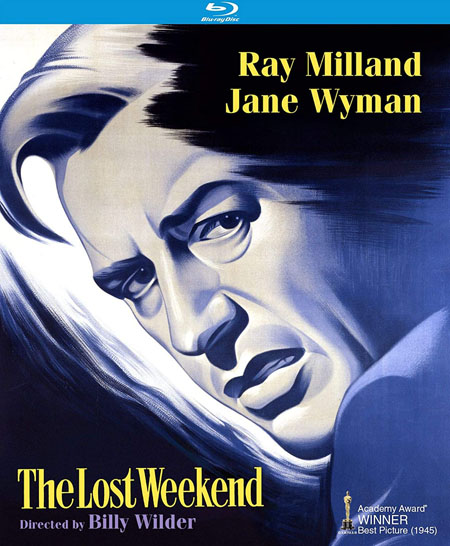
“THE
DTs IN HIGH DEFINITIONâ€
By
Raymond Benson
In
1945, Billy Wilder’s The Lost Weekend was a big deal. If it wasn’t the
first Hollywood movie to portray alcoholism as a serious problem, then it was
certainly the most visible and influential one.
In
the latter 1940s, Hollywood’s output changed from the sunshine-feel
good-entertainments that the Golden Age had produced in the 30s and early 40s.
American GIs came home from the war, and many were disillusioned and cynical.
The war was the catalyst for Americans to “grow up.†They were ready to accept
more serious, darker fare. Thus, we got film noir—crime pictures that
were full of angst and betrayals—and we got the “social problem film.†The
latter tackled subjects that Hollywood had previously never touched—alcoholism,
racism, anti-Semitism, government corruption, and drug abuse. Titles like Gentleman’s
Agreement, All the King’s Men, Pinky, and The Lost Weekend,
which kick-started the trend.
Starring
Ray Milland in a harrowing performance as Don Birnam, a hopeless drunk in
Manhattan, the picture presents a “realisticâ€â€”for the time—depiction of a
weekend bender, a binge complete with DTs and night terrors. Jane Wyman costars
as Birnam’s long-suffering girlfriend, Helen. From the get-go, she sympathizes
with Birnam and haplessly attempts to help him with his problem. Birnam’s
brother, Wick (Phillip Terry), also indulges him, although he’s at the point of
giving up.
The
movie’s gritty wake-up call was likely the reason it won the Academy Awards for
Best Picture, Best Director, Best Adapted Screenplay (by Wilder and Charles
Brackett, based on the novel by Charles R. Jackson), and Best Actor (Milland).
That
said, today The Lost Weekend has problems. Billy Wilder was one of the
great Hollywood writer-directors, and his handling of the material is fine.
Milland deserved his Oscar win, although he’s often over the top—which perhaps
underscored the horror of the film’s subject matter. The difficulty that
today’s audiences will have with the film is its naivete. For one thing, Helen must
be nuts and a glutton for punishment to stick around Birnam for over three
years. The biggest sin is the abrupt “everything’s going to be okay†ending,
which will assuredly cause one’s eyes to roll.
In
many ways, there’s not too fine a line between The Lost Weekend and some
of the better cheap exploitation films about drug abuse and teen sex that were
made outside of Hollywood and were exhibited in the manner of a sleazy
sideshow. The difference is that Weekend had a big budget, stars, and
the benefit of being backed by a major studio and was made in Hollywood. The sensationalism
and morality-play aspects, though, are the same.
Kino
Lorber’s new high definition restoration looks darned good, despite some visual
artifacts here and there. The audio commentary by film historian Joseph McBride
delves into the production history and offers interesting anecdotes. The
supplements include the complete radio adaptation starring Milland and Wyman,
plus a “Trailers from Hell†segment with Mark Pellington narrating. Theatrical
trailers for this and other Kino Lorber releases round out the package.
Make
no mistake—The Lost Weekend is an important American picture that broke
new ground. One must always judge a movie within the context of when it was
made and released. Nevertheless, 75 years has not been kind to the film.
For
fans of Billy Wilder, cinema history, and a stiff drink.
CLICK HERE TO ORDER FROM AMAZON